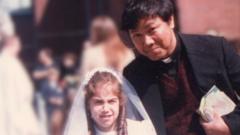As the Roman Catholic Church faces critical decisions following Pope Francis' death, the legacy of his response to the clergy sexual abuse crisis remains deeply contested. Advocates for victims are grappling with the belief that, while some progress was made during his papacy, significant barriers and a culture of concealment persist. Victims like MacPherson are calling for more decisive actions and transparency from Church authorities to ensure true accountability and healing.
In Boston, Alexa MacPherson's story serves as a poignant reminder of the ongoing struggle for justice in an institution marred by scandal. At the age of three, MacPherson was subjected to years of abuse by priest Peter Kanchong, a trauma she is now seeking to expose in light of the Church's troubling history. "There's so much more that the Church and the Vatican can do," she asserts, as she watches the Church navigate the challenge of reform amidst the selection of a new pope.
Criticism of Pope Francis' measures, including new laws intended to address abuse allegations, indicates that many feel his efforts were not comprehensive enough, often implying that safeguards against child abuse remain insufficient. While acknowledging some progress, victims like MacPherson remain skeptical about meaningful change and continue to advocate for fundamental accountability for clerics and those who enabled abusers.
The forthcoming election of a new pope carries with it the hope for tangible reforms that go beyond mere acknowledgment, as victims advocate for necessary disclosures and stricter consequences for those involved in abuse. As the Church immerses itself in this pivotal moment, the voices of survivors echo, pressing for transparency and justice within the institution they once trusted.
In Boston, Alexa MacPherson's story serves as a poignant reminder of the ongoing struggle for justice in an institution marred by scandal. At the age of three, MacPherson was subjected to years of abuse by priest Peter Kanchong, a trauma she is now seeking to expose in light of the Church's troubling history. "There's so much more that the Church and the Vatican can do," she asserts, as she watches the Church navigate the challenge of reform amidst the selection of a new pope.
Criticism of Pope Francis' measures, including new laws intended to address abuse allegations, indicates that many feel his efforts were not comprehensive enough, often implying that safeguards against child abuse remain insufficient. While acknowledging some progress, victims like MacPherson remain skeptical about meaningful change and continue to advocate for fundamental accountability for clerics and those who enabled abusers.
The forthcoming election of a new pope carries with it the hope for tangible reforms that go beyond mere acknowledgment, as victims advocate for necessary disclosures and stricter consequences for those involved in abuse. As the Church immerses itself in this pivotal moment, the voices of survivors echo, pressing for transparency and justice within the institution they once trusted.






















